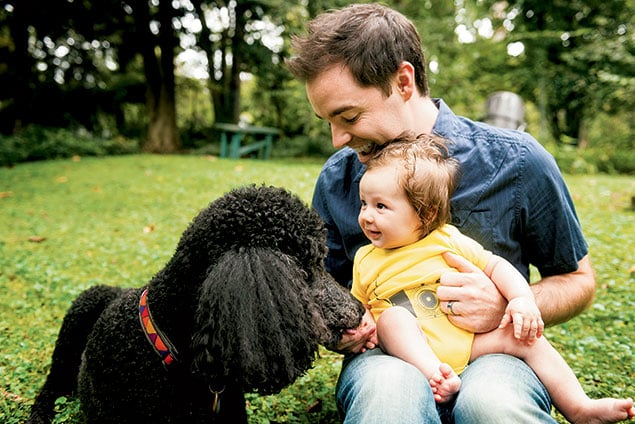Charlie, our four-month-old son, was not our first, or even second, baby.
Klondike was in our lives years before my wife, Molly, and I were married. The white standard poodle adored kids, and now that we have one of our own, we often wish Klondike were around to enjoy the experience. He died two years before Charlie was born this past June. But we show our son lots of photos and videos of him, so he knows about his oldest canine brother.
We got Oliver, a black standard poodle, five years ago. He was two, had been left at a shelter where he spent most of the time in a crate, and was on a list of soon-to-be-put-down dogs. Oliver was more hyper than Klondike, but we didn’t blame him—being free of that cage must have felt like heaven. He had enough time with Klondike to learn the ropes from the older dog and soon settled into a routine, including napping and lounging in our guest bedroom, where he had the best view of our front door and the squirrels on our Takoma Park street.
And therein lay the first challenge of bringing a baby onto the scene—Oliver’s favorite spot would have to become a nursery.
Like typical first-time parents, we dug into multiple baby-advice books in the run-up to Charlie’s arrival. They all had opinions on how to help dogs deal. One instructed us to get a doll and pretend it was real in front of Oliver. We drew the line there—a good thing because Oliver probably would have treated it like a stuffed toy, shredding it as we watched in horror. But we did our best to absorb other tips, such as introducing baby and dog slowly and letting Oliver sniff some of Charlie’s clothes before they met.
Turns out, like a lot of the stuff in those books, such instructions are easier given than followed. On the afternoon we brought Charlie home, we were starving, stressed, and sorely in need of hot showers after our son had sprung a 102-degree fever, prolonging our hospital stay to a full week.
Though family and friends had cared for Oliver, he hadn’t had any quality time with me or Molly in days. After all our preparation, this was how the big moment was poised to go down: Oliver, attention-starved and likely pretty pissed, and us, totally exhausted. I set the car seat on the couch and hoped Oliver would be his usual, sunny self.
He was—and I’m eternally grateful.
But we’ve all been adjusting ever since. Oliver takes his role as older brother very seriously. The first time we took Charlie for a walk, my mother, who was visiting, said Oliver spent the whole time whimpering and pacing, pining for Charlie’s safe return. When the baby fusses, Oliver sits nearby quietly, as if waiting to be called into service. Not quite as sweet: Once happy to see other dogs, Oliver, now ultra-protective of Charlie, goes rigid and often growls when we encounter them. (Apologies to Panda, Cocoa, and Sadie—we’re working on it.)
It’s also not so cute when our black dog darts in front of us as we stumble around in a dark house for middle-of-the-night feedings. And I’m not sure I’ve hated anyone more than the mailmen and various political and religious solicitors who seem to ring our doorbell at the exact moment Charlie has finally passed out. The dog goes nuts. Then the baby. Then Mommy and Daddy.
No, it’s not always easy. But to his credit, Oliver has mostly made his sacrifices without complaint. That regular 6:30 am walk he cherished? It gets bumped to 8 or 9 now, and he’s figured out how to rely on his dog door until then. His squirrel-watching and naps mostly happen on the living-room couch. The view isn’t nearly as good as the one he had from the old guest bedroom, but he doesn’t seem to mind—at least not too much.
Former homepage editor Chris Campbell (ccampb4@mac.com) is a stay-at-home dad. This article appears in the November 2014 issue of Washingtonian.


















